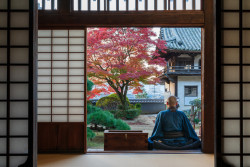
The other night, my friend Yoshimi asked if we could stop at her mother-in-law’s house on our way home from shopping. “She’s got some vegetables for us,” Yoshimi said. “Would you mind? I don’t think it will take long.”
The light was on over the front door when we arrived at a simple two-story home on a narrow backstreet. Inside, Yoshimi’s mother-in-law bustled in a tidy but very full kitchen. A low chair next to an even lower table took up the center of a dining room where the floors gleamed. In the white glare of the fluorescent light, I could see stacks of papers, old plastic containers, artificial flowers in pretty little vases set here and there, houseplants lined up in front of curtained sliding glass doors, and off in a corner, the family shrine.
“You’re so tall,” Yoshimi’s mother-in-law said as she offered me a seat at the low table and a cup of tea. I smiled and the three of us shared a laugh as she stood next to me for comparison. She only came up to my elbow, with her perfectly coiffed salt-and-pepper hair and tanned face.
Within moments, she offered us food to go with our tea. I watched and listened as she and Yoshimi moved about the kitchen together with ease, pulling containers of food out of the refrigerator, talking about this relative and that grandchild as they assembled the meal.
“You have too many dishes, Mother,” Yoshimi said with a laugh and just a hint of exasperation as she knelt in front of a cupboard stuffed with small bowls, plates, and cups.
“I like them,” her mother-in-law shrugged as she doled out homemade tsukemono (pickles) and steaming rice.
“Mothers are the same everywhere,” I commented, and described how the cupboards in my own mother’s house in the United States overflowed with dishes and knickknacks. Yoshimi and her mother-in-law laughed and nodded.
We travel the world to explore and discover the secrets of life, to experience new cultures, and hear new languages; but the longer I live abroad, the more I find that whether I’m in Japan, Nepal, England, Kazakhstan, or my home state of Wisconsin, some patterns are repeated.
Not far under the layers of a different language, religion, food, and culture are people and roles easily recognized. I see my father in a black-suited salaryman who offers his seat to the exhausted and hugely pregnant woman on the train, moved by a heart that expresses itself through work and small gestures, rather than so many words. I see my mother in the woman who presses me with food even after I’ve eaten my fill, one of the best ways she knows to show her affection and regard. I see my niece in the young woman in my class who is both confident and shy, testing the waters of adulthood, and reflecting on what she finds. When the construction worker pauses a moment to photograph a rainbow or a bright blooming tulip nearby, I understand his sentiment perfectly. All around me, in this new country I now call home, I see so much that is familiar—echoes of so many that I know and love, friends and family alike, and even those I am wary of: the drunk woman who leans in too close, or the man who tends toward anger and violence.
People are people, perfect and imperfect all at once. Undoubtedly, each of us consists, too, of the complex combination of life events, circumstance, and personality that make us individuals. But there are also elements we recognize that allow us, however briefly, to understand and connect. We discover through shared smiles and laughter, by lending a hand or accepting a cup of tea, that in the end, whether home or away, our humanity is what we share.







